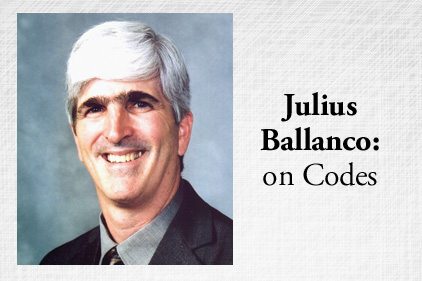
|
During the last week of September, the ICC celebrated its 10th anniversary as a combined code organization. It has been that long since BOCA, ICBO and SBCCI joined forces.
ICC has grown very quickly with adoptions of one or more codes in each of the 50 states. Being so big, the ICC has become small. What does that mean? With only one annual meeting held somewhere in the United States, it is difficult for the inspectors to make it to the ICC annual conference. As a result, attendance is down at the code hearings. This is not good since the code hearings are the lifeblood of the ICC.
The inspector attendance and scheduling of the plumbing code hearing for the International Residential Code was miserable. The code hearing started at 7:15 p.m. Saturday, Oct. 5, and proceeded until completion much later that evening.
The first question you may be asking is, “Who wants to give up their Saturday evening to sit and listen to arguments over code changes to the residential plumbing requirements?”
The answer is, “Anyone that wants to control the code.” This is something the Virginia Plumbing and Mechanical Inspectors figured out a few years ago. As a result, it stuffs the hearings with its members in order to control the outcome of the code. Plus, the group keeps its members there until the very end. If you want a plumbing code change approved, you have to go through Virginia. That is the control it has managed to obtain.
I give them credit; the Virginians often make good decisions. However, when they make bad decisions, they are really bad. They adversely impacted the rest of the country using the ICC plumbing code; in this case, the plumbing section of the Residential Code.
That was the case for the very last code change. The vote took place at 10:15 p.m. with only 29 voting members. Of those 29, 16 members, mostly Virginians, overturned a committee recommendation of a code change.
Think about that: 16 people voting. The entire United States is being penalized by the vote of 16 individuals. That is dead wrong.
The code change was originally approved by a committee of 11 members who are selected among the best and brightest. Yet, 16 inspectors can change the course of these 11 individuals who thoroughly studied every code change.
The code change in question proposed to allow food waste disposers to discharge to a combination waste and vent system. Unlike most code changes, this was supported by a peer-reviewed research paper issued by the American Society of Plumbing Engineers Research Foundation. I currently serve as president of the Research Foundation and, naturally, this really bothered me. I take pride in those peer review papers.
But in the case of the Virginia inspectors, they seem to know more than an ASPE RF peer-reviewed paper. They had the audacity to question the research. What they failed to realize is that questioning the research is part of the peer-review process. Even after a paper is issued, they could have submitted a comment for peer review. I did submit their comment for peer review and received a response (to read, please visit www.pmengineer.com)
The public comment submitted by the Virginia inspectors claimed the ASPE RF did not consider the real reason why disposers are not permitted to discharge to a combination waste and vent system. They claim the lower-flow velocities in the oversized pipe could lead to stoppages from the solids in the drain line. They also claimed the ASPE RF didn’t consider old pipe.
The Virginians beat their chests, proclaiming they knew all this and the ASPE RF didn’t. Of course, if they thought their public comment through logically, they would have realized how foolish their statements were. They actually thought when the code said the minimum trap size was 1 1/2 in., the pipe had to be 1 1/2 in. The word “minimum” refers to the smallest size, not the largest size. There is no largest size requirement in the code. Hence, a food waste disposer can already connect to a 2-, 3- or 4-in. pipe.
Furthermore, this was studied under the peer review of the ASPE RF test protocol. There are video clips showing the performance of flow from the food waste disposer in 2-, 3- and 4-in. pipes.
Another problem with the Virginians public comment was that none of their current members were present when the original restriction was added to the code. They didn’t bother to research the fact that the code change was submitted a while ago by the now-retired Oklahoma chief plumbing inspector. At the time, he claimed food waste disposers would create a pumping action and result in the loss of the trap seal of the other appliances being vented by the combination waste and vent system. Of course, this doesn’t happen. The ASPERF easily proved this was all in someone’s imagination.
The Residential Plumbing and Mechanical Code Committee agreed that the ASPERF research clearly demonstrated food waste disposers can discharge to a combination waste and vent system. At the first hearing, there were no objections to the proposed code change. Following the hearings, the Virginians decided to challenge the committee’s decision with a public comment even though they were present and said nothing at the first hearing.
The ICC knows it has a serious problem. Its staff and board members sit and watch the code hearings. That is why this was the last code hearing where only 16 people could control the outcome of a code. Next year, the ICC switches to an online voting process for code changes. Inspectors will be able to watch the code hearing either in person or online. Then they will be able to cast their vote. ICC expects hundreds of votes, not just 16.
Many within ICC are placing high hopes in the new voting process. The system it has abandoned was broken. Unfortunately, the public has to deal with some less-than-stellar code restrictions from the broken process for the next five years (until 2018).
I have high hopes the new ICC voting process will have better results for the many intelligent code changes.



